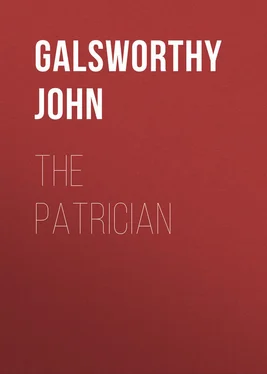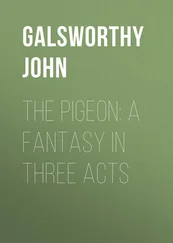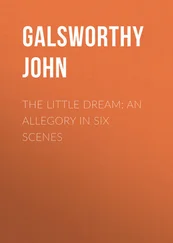John Galsworthy - The Patrician
Здесь есть возможность читать онлайн «John Galsworthy - The Patrician» — ознакомительный отрывок электронной книги совершенно бесплатно, а после прочтения отрывка купить полную версию. В некоторых случаях можно слушать аудио, скачать через торрент в формате fb2 и присутствует краткое содержание. Жанр: foreign_antique, foreign_prose, на английском языке. Описание произведения, (предисловие) а так же отзывы посетителей доступны на портале библиотеки ЛибКат.
- Название:The Patrician
- Автор:
- Жанр:
- Год:неизвестен
- ISBN:нет данных
- Рейтинг книги:5 / 5. Голосов: 1
-
Избранное:Добавить в избранное
- Отзывы:
-
Ваша оценка:
- 100
- 1
- 2
- 3
- 4
- 5
The Patrician: краткое содержание, описание и аннотация
Предлагаем к чтению аннотацию, описание, краткое содержание или предисловие (зависит от того, что написал сам автор книги «The Patrician»). Если вы не нашли необходимую информацию о книге — напишите в комментариях, мы постараемся отыскать её.
The Patrician — читать онлайн ознакомительный отрывок
Ниже представлен текст книги, разбитый по страницам. Система сохранения места последней прочитанной страницы, позволяет с удобством читать онлайн бесплатно книгу «The Patrician», без необходимости каждый раз заново искать на чём Вы остановились. Поставьте закладку, и сможете в любой момент перейти на страницу, на которой закончили чтение.
Интервал:
Закладка:
It has been said that except for one lapse his life had been austere, but this is not to assert that he had no capacity for passion. The contrary was the case. That flame which had been so jealously guarded smouldered deep within him – a smothered fire with but little air to feed on. The moment his spirit was touched by the spirit of this woman, it had flared up. She was the incarnation of all that he desired. Her hair, her eyes, her form; the tiny tuck or dimple at the corner of her mouth just where a child places its finger; her way of moving, a sort of unconscious swaying or yielding to the air; the tone in her voice, which seemed to come not so much from happiness of her own as from an innate wish to make others happy; and that natural, if not robust, intelligence, which belongs to the very sympathetic, and is rarely found in women of great ambitions or enthusiasms – all these things had twined themselves round his heart. He not only dreamed of her, and wanted her; he believed in her. She filled his thoughts as one who could never do wrong; as one who, though a wife would remain a mistress, and though a mistress, would always be the companion of his spirit.
It has been said that no one spoke or gossiped about women in Miltoun’s presence, and the tale of her divorce was present to his mind simply in the form of a conviction that she was an injured woman. After his interview with the vicar, he had only once again alluded to it, and that in answer to the speech of a lady staying at the Court: “Oh! yes, I remember her case perfectly. She was the poor woman who – ” “Did not, I am certain, Lady Bonington.” The tone of his voice had made someone laugh uneasily; the subject was changed.
All divorce was against his convictions, but in a blurred way he admitted that there were cases where release was unavoidable. He was not a man to ask for confidences, or expect them to be given him. He himself had never confided his spiritual struggles to any living creature; and the unspiritual struggle had little interest for Miltoun. He was ready at any moment to stake his life on the perfection of the idol he had set up within his soul, as simply and straightforwardly as he would have placed his body in front of her to shield her from harm.
The same fanaticism, which looked on his passion as a flower by itself, entirely apart from its suitability to the social garden, was also the driving force which sent him up to London to declare his intention to his father before he spoke to Mrs. Noel. The thing should be done simply, and in right order. For he had the kind of moral courage found in those who live retired within the shell of their own aspirations. Yet it was not perhaps so much active moral courage as indifference to what others thought or did, coming from his inbred resistance to the appreciation of what they felt.
That peculiar smile of the old Tudor Cardinal – which had in it invincible self-reliance, and a sort of spiritual sneer – played over his face when he speculated on his father’s reception of the coming news; and very soon he ceased to think of it at all, burying himself in the work he had brought with him for the journey. For he had in high degree the faculty, so essential to public life, of switching off his whole attention from one subject to another.
On arriving at Paddington he drove straight to Valleys House.
This large dwelling with its pillared portico, seemed to wear an air of faint surprise that, at the height of the season, it was not more inhabited. Three servants relieved Miltoun of his little luggage; and having washed, and learned that his father would be dining in, he went for a walk, taking his way towards his rooms in the Temple. His long figure, somewhat carelessly garbed, attracted the usual attention, of which he was as usual unaware. Strolling along, he meditated deeply on a London, an England, different from this flatulent hurly-burly, this ‘omniuin gatherum’, this great discordant symphony of sharps and flats. A London, an England, kempt and self-respecting; swept and garnished of slums, and plutocrats, advertisement, and jerry-building, of sensationalism, vulgarity, vice, and unemployment. An England where each man should know his place, and never change it, but serve in it loyally in his own caste. Where every man, from nobleman to labourer, should be an oligarch by faith, and a gentleman by practice. An England so steel-bright and efficient that the very sight should suffice to impose peace. An England whose soul should be stoical and fine with the stoicism and fineness of each soul amongst her many million souls; where the town should have its creed and the country its creed, and there should be contentment and no complaining in her streets.
And as he walked down the Strand, a little ragged boy cheeped out between his legs:
“Bloodee discoveree in a Bank – Grite sensytion! Pi-er!”
Miltoun paid no heed to that saying; yet, with it, the wind that blows where man lives, the careless, wonderful, unordered wind, had dispersed his austere and formal vision. Great was that wind – the myriad aspiration of men and women, the praying of the uncounted multitude to the goddess of Sensation – of Chance, and Change. A flowing from heart to heart, from lip to lip, as in Spring the wistful air wanders through a wood, imparting to every bush and tree the secrets of fresh life, the passionate resolve to grow, and become – no matter what! A sighing, as eternal as the old murmuring of the sea, as little to be hushed, as prone to swell into sudden roaring!
Miltoun held on through the traffic, not looking overmuch at the present forms of the thousands he passed, but seeing with the eyes of faith the forms he desired to see. Near St. Paul’s he stopped in front of an old book-shop. His grave, pallid, not unhandsome face, was well-known to William Rimall, its small proprietor, who at once brought out his latest acquisition – a Mores ‘Utopia.’ That particular edition (he assured Miltoun) was quite unprocurable – he had never sold but one other copy, which had been literally, crumbling away. This copy was in even better condition. It could hardly last another twenty years – a genuine book, a bargain. There wasn’t so much movement in More as there had been a little time back.
Miltoun opened the tome, and a small book-louse who had been sleeping on the word ‘Tranibore,’ began to make its way slowly towards the very centre of the volume.
“I see it’s genuine,” said Miltoun.
“It’s not to read, my lord,” the little man warned him: “Hardly safe to turn the pages. As I was saying – I’ve not had a better piece this year. I haven’t really!”
“Shrewd old dreamer,” muttered Miltoun; “the Socialists haven’t got beyond him, even now.”
The little man’s eyes blinked, as though apologizing for the views of Thomas More.
“Well,” he said, “I suppose he was one of them. I forget if your lordship’s very strong on politics?”
Miltoun smiled.
“I want to see an England, Rimall, something like the England of Mores dream. But my machinery will be different. I shall begin at the top.”
The little man nodded.
“Quite so, quite so,” he said; “we shall come to that, I dare say.”
“We must, Rimall.” And Miltoun turned the page.
The little man’s face quivered.
“I don’t think,” he said, “that book’s quite strong enough for you, my lord, with your taste for reading. Now I’ve a most curious old volume here – on Chinese temples. It’s rare – but not too old. You can peruse it thoroughly. It’s what I call a book to browse on just suit your palate. Funny principle they built those things on,” he added, opening the volume at an engraving, “in layers. We don’t build like that in England.”
Miltoun looked up sharply; the little man’s face wore no signs of understanding.
Читать дальшеИнтервал:
Закладка:
Похожие книги на «The Patrician»
Представляем Вашему вниманию похожие книги на «The Patrician» списком для выбора. Мы отобрали схожую по названию и смыслу литературу в надежде предоставить читателям больше вариантов отыскать новые, интересные, ещё непрочитанные произведения.
Обсуждение, отзывы о книге «The Patrician» и просто собственные мнения читателей. Оставьте ваши комментарии, напишите, что Вы думаете о произведении, его смысле или главных героях. Укажите что конкретно понравилось, а что нет, и почему Вы так считаете.












